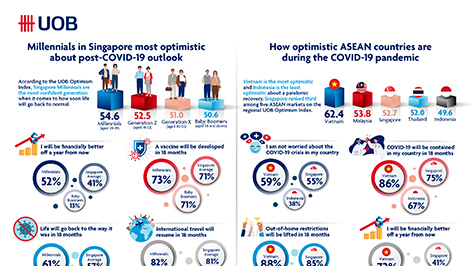As people manage with the financial, social and health implications of COVID-19, Millennials have emerged as the most optimistic age group in Singapore when it comes to overcoming current challenges, according to the UOB Optimism Index1.
The UOB Optimism Index measures how concerned consumers are about rising COVID-19 infections, continued restrictions on gatherings and travel, the economic impact of the pandemic and their personal financial well-being and outlook2. Out of a maximum score of 100, Millennials scored 54.6, ahead of Generation Z’s 52.5, Generation X’s 51.0 and Baby Boomers’ 50.6.
Millennials are most confident of their financial standing and believe that they will be financially better off in the next one year. They are also most optimistic about life going back to the way it was before, and that a vaccine will be developed, and hence less worried than the other generations.
One issue the four generations had varying estimates on was when a COVID-19 vaccine is likely to be available – an important milestone on the roadmap to controlling the pandemic. Millennials led the other age groups, with 53 per cent expecting a vaccine within 12 months, compared with 47 per cent of Baby Boomers3. In another gauge of optimism, respondents were asked when they thought life would go back to the way it was before COVID-19. Millennials again have the highest share of respondents offering an optimistic prognosis, with 61 per cent expecting life to return to the pre-COVID-19 normal within the next 18 months, ahead of Baby Boomers (53 per cent)4.
In forecasting their personal financial well-being, the four generations gave widely varying responses. More than half of Millennials (52 per cent) say they are likely to be financially better off in a year’s time, versus 47 per cent of Generation Z, 34 per cent of Generation X and just 13 per cent of Baby Boomers. Millennials are also least worried about losing their jobs5 or being able to afford essentials6.
This confidence in the future has led to them investing more during the pandemic, with one in three saying they have increased their investments and two in five planning to do so in the next six months. Among UOB’s wealth customers, Millennials had 30 per cent more assets under management (AUM) at the end of June 2020 than they did three years before – a substantially larger increase compared with wealth customers from other age groups.
Ms Jacquelyn Tan, Head of Group Personal Financial Services, UOB, said, “Coping with the pandemic has been an enormous challenge for individuals across different age groups. The UOB Optimism Index shows Millennials in Singapore have a rosier outlook than other generations and provide a burst of positivity amid the everyday struggles people are experiencing. The UOB Optimism Index also shows that Baby Boomers in general are more concerned about their finances given their shorter horizons and the higher likelihood their investments or retirement savings will be impacted by near-term market fluctuations and low interest rates.
“At UOB, we stand ready to assist customers of all generations to ensure they have the financial support they need to meet their long-term goals – whether it is paying for their education, buying a home or planning for their retirement. How we can assist them is through our Risk-First approach which focuses building and safeguarding their financial assets. As COVID-19 has taught us, being prepared and resilient when times are tough is critical to emerging stronger when better times return,” Ms Tan said.
Singapore scores well on optimism among ASEAN peers
Across the region7, Singapore ranked in the middle on the UOB Optimism Index with a score of 52.7, behind Vietnam (62.4) and Malaysia (53.8) but ahead of Thailand (52.0) and Indonesia (49.6).
Despite the moderate ranking, Singapore came out ahead of its ASEAN neighbours on a number of optimism measures, which can be partly attributed to the ‘circuit breaker’ measures that halted a rapid spread of cases in the community. About eight in 10 Singapore respondents anticipate that within 18 months, international travel will resume8 and COVID-19 will be contained domestically9 – higher than in other markets. More Singapore respondents also expect a vaccine to be developed in the next 18 months10.
In view of Vietnam’s relative success in keeping its number of confirmed COVID-19 cases low11, eight in 10 Vietnamese respondents expect that life will go back to the way it was within 18 months, versus the survey average of six in 10 respondents. Looking ahead to a possible economic recovery in 2021, seven in 10 respondents in Vietnam also believe they will be financially better off in a year’s time, compared with the average of four to six in 10 among all respondents.
The UOB Optimism Index was derived from the Bank’s UOB ASEAN Consumer Sentiment Study, which aims to provide a better understanding of ASEAN consumers at a time when the region is undergoing deep social and economic transformation. For the study’s inaugural run in July 2020, more than 3,500 respondents from five ASEAN countries were interviewed, including 1,000 from Singapore and more than 600 each from Indonesia, Malaysia, Thailand and Vietnam.
1 The UOB Optimism Index compares Millennials (aged 24 to 39), against Generation Z (aged 18 to 23), Generation X (aged 40 to 55) and the Baby Boomer Generation (aged 56 and above).
2 The 10 indicators that make up the UOB Optimism Index are: (1) level of negative emotions (e.g. worried), level of positive emotions (e.g. hopeful), (3) concern about rising infections, (4) expecting an impending recession, (5) expecting COVID-19 to be contained, (6) expecting movement restrictions to be lifted, (7) expecting international travel to resume, (8) expecting a vaccine to be developed, (9) expecting life to return to normal and (10) expecting oneself to be financially better off. Each indicator carries a maximum score of 10, adding up to the total maximum score of 100.
3 The overall average among Singapore respondents was 49 per cent.
4 The overall average among Singapore respondents was 57 per cent.
5 Among Millennials, 65 per cent were somewhat or very worried about the possibility of losing their jobs, slightly lower than Generation X (67 per cent), the Baby Boomer Generation (68 per cent) and Generation Z (70 per cent).
6 Among Millennials, 57 per cent were somewhat or very worried about their ability to afford essential items of themselves or their families, lower than Generation X (61 per cent), the Baby Boomer Generation (63 per cent) and Generation Z (69 per cent).
7 The survey was completed in July 2020. Notable developments in the region since then include the re-imposition of the conditional movement control order (CMCO) in parts of Malaysia in October 2020, restricting the movement of individuals and suspending some social and economic activity. Meanwhile, Singapore announced in October 2020 an in-principle agreement with Hong Kong to establish a bilateral air travel bubble.
8 On the likelihood of international travel resuming within 18 months, Singapore and Vietnam both scored 81 per cent, ahead of Indonesia (76 per cent), Thailand (75 per cent) and Malaysia (73 per cent).
9 On whether COVID-19 will be contained in the country within 18 months, Singapore (75 per cent) was just behind Vietnam (86 per cent) but ahead of, Malaysia and Thailand (both 73 per cent), as well as Indonesia (67 per cent).
10 On whether a vaccine will be developed within 18 months, more respondents in Singapore (72 per cent) believed so, ahead of Vietnam (71 per cent), Indonesia (71 per cent), Thailand (62 per cent) and Malaysia (57 per cent).
11 Vietnam has seen over 1,100 confirmed cases of COVID-19, or about 11 cases per million people.





